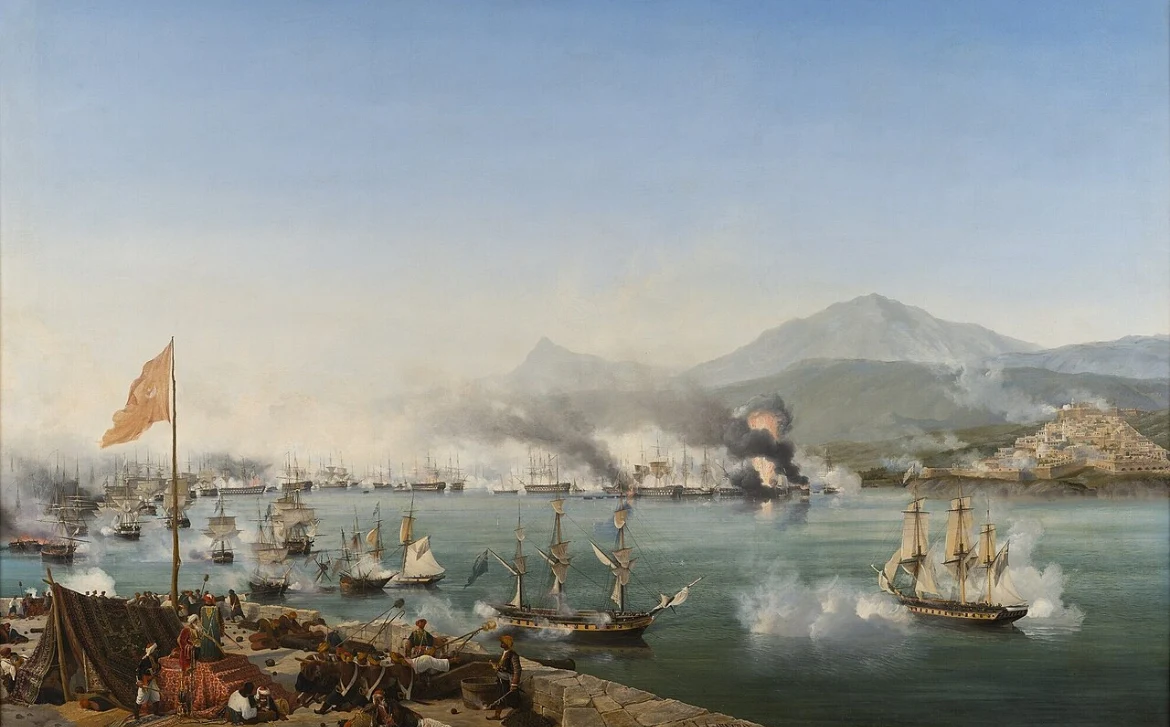From a Naval Miscalculation to a Strategic Catastrophe – A Reflection on a Long Legacy of Neglecting Vital Interests
On October 20, 1827, the Battle of Navarino unfolded in a small bay off the southwestern Peloponnese (in present-day Greece), significantly altering the balance of power in the Mediterranean. Yet, for Algerians, the true significance lies not solely in the military events of that day, but in the deeper question of how Algeria—then an autonomous maritime power under nominal Ottoman suzerainty—became entangled in a war that did not concern it directly, ultimately paying a staggering strategic price from which it would not recover for more than a century.
1. Historical and Political Context of the Battle of Navarino
The early 19th century witnessed a surge of national liberation movements across Europe, among them the Greek War of Independence against Ottoman rule, which broke out in 1821. This uprising gained widespread support from European powers, who saw it as an opportunity to weaken the Ottoman Empire and expand their influence in the Eastern Mediterranean.
In response, the Sublime Porte sought military assistance from Muhammad Ali, governor of Egypt, who dispatched a powerful fleet led by his son Ibrahim Pasha. Algeria, for its part, contributed naval forces to support the Ottomans—even though the Greek revolt posed no direct or immediate threat to Algerian national security.
Despite ongoing tensions with European powers—particularly Britain and France—Algeria chose to intervene against the Greeks in the name of defending the “Islamic Caliphate,” according to the correspondence of the Deys at the time, with little regard for the geopolitical risks involved.
2. A Military Disaster with Far-Reaching Strategic Consequences
Britain, France, and Russia intervened militarily in favor of the Greek revolution, and their combined fleets launched an assault on the Ottoman-Egyptian-Algerian coalition at Navarino. Within a few hours, most allied ships were destroyed—including several of Algeria’s modern vessels—by European navies that were vastly superior in firepower and coordination.
British historian David Brewer, in his book The Greek War of Independence (2001), notes that “the destruction of the fleet at Navarino altered the balance of naval power in the Mediterranean, leaving Muslim coasts exposed to direct Western intervention.”
Indeed, just three years later, in 1830, France launched its invasion of Algeria. The country’s coastline lay unprotected, and the maritime power that had long served as a deterrent had been obliterated.
3. Foreign Policy Guided by Ideology, Not National Interest
History makes clear that Algeria’s involvement in the Battle of Navarino was not grounded in a rational calculation of national interest, but in ideological fervor and emotional allegiance to the “Islamic Caliphate”—even though Istanbul would later demonstrate little concern for Algeria’s fate, as evidenced by its silence in the face of the French occupation.
Algerian historian Abou El Kacem Saâdallah writes in volume IV of his Cultural History of Algeria:
“Algeria entered the battle out of loyalty to the Caliphate, not out of national interest… This was one of the key errors of Algerian policy at the end of the Ottoman era.”
4. A Recurrent Blind Spot in Contemporary Algerian Diplomacy
The historical parallel with today is striking. While Algeria’s official diplomacy rests on principles such as non-intervention and respect for national sovereignty, it often hesitates—or even remains silent—when it comes to clearly and forcefully defending its vital interests, particularly in matters of identity, security, and regional balance.
- In Libya, Algeria remained a passive observer for years, even as its eastern borders were threatened by militias backed by foreign powers.
- In the Sahel, it only began to pursue substantive security coordination with its neighbors after Western powers (France, the United States) stepped in to fill the vacuum.
- On the front of national identity, governmental indecision regarding language and cultural policies has opened the door to foreign ideological influence.
- When confronted with alliances hostile to Algeria’s identity—such as the Emirati-Israeli partnerships in the Sahel—Algerian diplomacy has often appeared hesitant or entirely absent.
5. In Praise of Realist Foreign Policy
The Battle of Navarino serves as a stark reminder of how a single miscalculation in strategic assessment can alter a nation’s destiny. Algeria was under no threat from Greece, yet chose to fight a war that was not its own, neglecting its most urgent priority: the defense of its sovereignty and maritime security.
This raises fundamental questions for the present:
- Has Algeria truly learned from its history?
- Does it place its national interests above symbolic “legitimacies” and sentimental alliances?
- Will it stop paying the price of battles that are not its own, fought for the benefit of powers that never act without self-interest?
Conclusion
From Navarino to the present day, the same lesson endures:
He who fails to prioritize his interests will inevitably bear the cost of others’ priorities.
Effective diplomacy is not about slogans—it is about unwavering defense of the national interest, through firm decisions, carefully chosen alliances, and a strong, unapologetic voice on the international stage.
By Belgacem Merbah
Sources:
- David Brewer, The Greek War of Independence, Overlook Press, 2001.
- Abou El Kacem Saâdallah, Cultural History of Algeria, vol. IV, Dar El Gharb El Islami.
- Philip Mansel, Levant: Splendour and Catastrophe on the Mediterranean, John Murray, 2010.
- British Naval Strategic Studies Institute, Navarino and the Shift of Mediterranean Naval Power, 2003.
- Ottoman Archives: Correspondence between the Sublime Porte and the Deys of Algiers (1826–1827).

Comments
Post a Comment